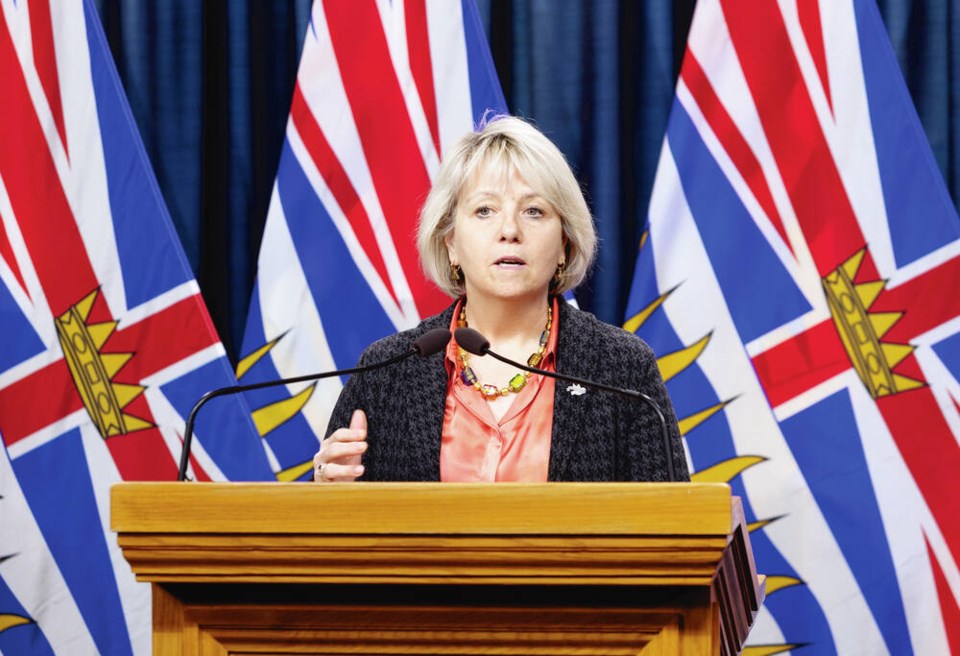COVID-19 modelling suggests new Omicron variant cases in B.C. have peaked, but hospitalizations will continue to spike until next weekend, says provincial health officer Dr. Bonnie Henry.
“We hit the peak of community transmission in British Columbia, probably this past weekend,” Henry said at a media briefing Friday.
“But we are still at the point where our hospitalization rate is going up.”
Hospital admissions lag about six to eight days beyond a person testing positive for COVID-19, meaning admissions of about 30 to 40 a day in B.C. will continue to increase until hitting a peak by Jan. 22, according to the modelling.
The census or number of people actually in hospital — which hit a record 646 Friday, including 95 in intensive care — lags another week or two behind admissions because of the time people need to recuperate, so that peak could be two to three weeks from today.
On Friday, the province reported 2,275 new cases of COVID-19 in B.C., of which 297 were in Island Health for a total of 35,943 active cases province-wide, including 3,016 on the Island.
Henry said restrictions imposed last month and the postponing of scheduled surgeries were intended to reduce the transmissions and hospitalizations we’re seeing now.
“It’s this next few weeks that are going to be the most challenging yet on our health-care system,” she said.
Not only are more people expected to be hospitalized, but steady high numbers of new infections will sicken more health-care workers.
B.C. Health Minister Adrian Dix said the province has about 188,000 active health care workers. From Jan. 3 to 9, across health authorities except Island and Interior health regions for which the numbers weren’t yet available, 14,591 health care workers called in sick compared with 7,573 in 2021, and 8,802 in 2020 for the same weeks.
“This is an immensely challenging time,” said Dix. “When you have incrementally 10,000 more health care workers off sick in a given week, either one day or more, that has an impact on services and we are adapting everywhere.”
Henry said it’s important to note who is being hospitalized and dying and try to “affect that trajectory in the next few weeks.”
Under Omicron, most people are not getting a severe-enough illness that they need to be hospitalized but there’s an uptick in young people being hospitalized and a “dramatic increase” in hospitalizations and uptick in deaths in people 70 and older, even if they are fully vaccinated.
As of Friday, there were 10 outbreaks in health-care facilities, the majority of which are long-term care, and there were another six deaths, one of which was in Island Health.
New modelling shows people with the Omicron variant spend about half the time in hospital as those with Delta and have 60 per cent less chance of ending up in critical care or dying versus those with Delta.
The number of people coming into emergency departments citing COVID has increased but the proportion being admitted to hospital is lower than in previous waves suggesting the severity of Omicron is less, said Henry.
The modelling shows that while many people who are vaccinated still become infected with Omicron, when age is taken out as a factor, an unvaccinated individual has a 12 times higher risk of being hospitalized, 27 times higher risk of ending up in critical care, and 40 times higher risk of dying.
B.C. is changing the way it records and reports hospitalizations to find out how many are in hospital with the Omicron or Delta variant as well as how many are admitted into hospital for COVID, and how many are considered “incidental” cases — people who test positive for COVID while in hospital.
Restrictions put in place last month — to be reviewed Jan. 18 — to slow the spread of Omicron include the closing of bars and gyms, limits on gatherings, the cancellation of sports tournaments, proof of vaccination requirements for all events, and restrictions on table numbers and movement in restaurants. In seniors homes, only one approved essential visitor is permitted per resident.
ceharnett@timescolonist




